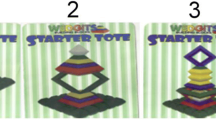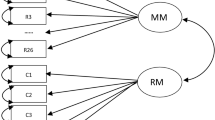Abstract
This paper describes historical and current trends in research on the development of metacognitive competencies. Stimulated by classic theoretical analyses of the concept of metacognition initiated by Ann Brown, John Flavell and their colleagues, contemporary extensions of the concept emphasize the important roles of both procedural and declarative metacognition for successful information processes. Major research findings on the development of these two components of metacognition are reviewed, and links between children’s early “theory of mind” and subsequent verbalizable metamemory are described. Next, new evidence on children’s metacognitive development in childhood and adolescence is summarized, indicating major shifts in children’s declarative metacognitive knowledge, in particular, their strategy knowledge, between the end of kindergarten and the end of elementary school. Although similarly fast developments could not be demonstrated for procedural metacognitive knowledge, several empirical studies suggest developmental changes in the relationship between monitoring and self-regulatory abilities, with older (but not younger) children being able to regulate their achievement-related behavior based on the outcome of their monitoring attempts. Finally, the paper reviews classic and contemporary applications of metacognitive theory to various educational settings, generally illustrating the importance of metacognition for various aspects of academic performance.
Access this chapter
Tax calculation will be finalised at checkout
Purchases are for personal use only
Similar content being viewed by others
References
Artelt C, Schiefele U, Schneider W (2002) Predictors of reading literacy. Eur J Psychol Educ 16:363-383
Astington JW, Jenkins JM (1999) A longitudinal study of the relation between language and theory of mind development. Dev Psychol 35:1311-1320
Borkowski JG, Milstead M, Hale C (1988) Components of children’s metamemory: implications for strategy generalization. In: Weinert FE, Perlmutter M (eds) Memory development: universal changes and individual differences. Erlbaum, Hillsdale, NJ, pp 73-100
Brown AL, Bransford JD, Ferrara RA, Campione JC (1983) Learning, remembering, and understanding. In: Flavell JH, Markham EM (eds) Handbook of child psychology. Cognitive development, vol 3 Wiley, New York, pp 77-166
Cultice JC, Somerville SC, Wellman HM (1983) Preschoolers’ memory monitoring: feeling-of-knowing judgments. Child Dev 54:1480-1486
DeLoache JS, Brown AL (1984) Where do I go next? Intelligent searching by very young children. Dev Psychol 20:37-44
Desoete A, Veenman M (eds) (2006) Metacognition in mathematics education. Nova Science, Haupauge, NY
Dufresne A, Kobasigawa A (1989) Children’s spontaneous allocation of study time: differential and sufficient aspects. J Exp Child Psychol 47:274-296
Efklides A (2001) Metacognitive experiences in problem solving: metacognition, motivation, and self-regulation. In: Efklides A, Kuhl J, Sorrentino RM (eds) Trends and prospects in motivation research. Kluwer, Dordrecht, The Netherlands, pp 297-323
Flavell JH (1979) Metacognition and cognitive monitoring a new area of cognitive-developmental inquiry. Am Psychol 34:906-911
Flavell JH (2000) Development of children’s knowledge about the mental world. Int J Behav Dev 24:15-23
Flavell JH, Wellman HM (1977) Metamemory. In: Kail R, Hagen J (eds) Perspectives on the development of memory and cognition. Erlbaum, Hillsdale, NJ, pp 3-33
Flavell JH, Miller PH, Miller SA (2002) Cognitive development, 4th edn. Prentice-Hall, Inc., Englewood Cliffs, NJ
Garner R (1987) Metacognition and reading comprehension. Ablex, Norwood, NJ
Ghatala ES, Levin JR, Pressley M, Goodwin D (1986) A componential analysis of effects of derived and supplied strategy-utility information on children’s strategy selections. J Exp Child Psychol 41:76-92
Goswami U (2008) Cognitive development - The learning brain, 2nd edn. Psychology Press, Hove, UK
Hasselhorn M (1990) The emergence of strategic knowledge activation in categorical clustering during retrieval. J Exp Child Psychol 50:59-80
Joyner MH, Kurtz-Costes B (1997) Metamemory development. In: Cowan N (ed) The development of memory in childhood. Psychology Press, Hove East Sussex, UK, pp 275-300
Justice EM (1985) Preschoolers’ knowledge and use of behaviors varying in strategic effectiveness. Merrill Palmer Q 35:363-377
Koriat A (1993) How do we know that we know? The accessibility model of the feeling of knowing. Psychol Rev 100:609-639
Kuhn D (1999) Metacognitive development. In: Balter L, Tamis-LeMonda CS (eds) Child psychology: a handbook of contemporary issues. Psychology Press, Philadelphia, PA, pp 259-286
Kuhn D (2000) Theory of mind, metacognition, and reasoning: a life-span perspective. In: Mitchell P, Riggs KJ (eds) Children’s reasoning and the mind. Psychology Press, Hove, UK, pp 301-326
Lockl K, Schneider W (2002) Developmental trends in children’s feeling-of-knowing judgements. Int J Behav Dev 26:327-333
Lockl K, Schneider W (2004) The effects of incentives and instructions on children’s allocation of study time. Eur J Dev Psychol 1:153-169
Lockl K, Schneider W (2006) Precursors of metamemory in young children: the role of theory of mind and metacognitive vocabulary. Metacognition Learn 1:15-31
Lockl K, Schneider W (2007) Knowledge about the mind: links between theory of mind and later metamemory. Child Dev 78:148-167
Masur EF, McIntyre CW, Flavell JH (1973) Developmental changes in apportionment of study time among items in a multitrial free recall task. J Exp Child Psychol 15:237-246
Metcalfe J (2002) Is study time allocated selectively to a region of proximal learning? J Exp Psychol Gen 131:349-363
Moely BE, Santulli KA, Obach MS (1995) Strategy instruction, metacognition, and motivation in the elementary school classroom. In: Weinert FE, Schneider W (eds) Memory performance and competencies: issues in growth and development. Erlbaum, Mahwah, NJ, pp 301-321
Nelson TO (1996) Consciousness and metacognition. Am Psychol 51:102-116
Nelson TO, Narens L (1990) Metamemory: a theoretical framework and new findings. In: Bower G (ed) The psychology of learning and motivation: advances in research and theory, vol 26. Academic Press, New York, pp 125-173
Nelson TO, Narens L (1994) Why investigate metacognition? In: Metcalfe J, Shimamura AP (eds) Metacognition. Knowing about knowing. MIT Press, Cambridge, MA, pp 1-25
Palincsar AS (1986) The role of dialogue in providing scaffolded instruction. Educ Psychol 21:73-98
Palincsar AS, Brown AL (1984) Reciprocal teaching of comprehension-fostering and comprehension-monitoring activities. Cognit Instruct 1:117-175
Paris SG, Oka ER (1986) Children’s reading strategies, metacognition, and motivation. Dev Rev 6:25-56
Perner J (1991) Understanding the representational mind. MIT Press, Cambridge, MA
Pressley M (1995) What is intellectual development about in the 1990s? In: Weinert FE, Schneider W (eds) Memory performance and competencies: issues in growth and development. Erlbaum, Hillsdale, NJ, pp 1-25
Pressley M, Afflerbach P (1995) Verbal protocols of reading: the nature of constructively responsive reading. Erlbaum, Hillsdale, NJ
Pressley M, Borkowski JG, Schneider W (1989) Good information processing: what it is and what education can do to promote it. Int J Educ Res 13:857-867
Roebers C, von der Linden N, Howie P, Schneider W (2007) Children’s metamemorial judgments in an event recall task. J Exp Child Psychol 97:117-137
Rosenshine B, Meister C (1994) Reciprocal teaching: a review of the research. Rev Educ Res 64:479-530
Ruffman T, Slade L, Crowe E (2002) The relation between children’s and mother’s mental state language and theory-of-mind understanding. Child Dev 73:734-751
Schneider W (1986) The role of conceptual knowledge and metamemory in the development of organizational processes in memory. J Exp Child Psychol 42:218-236
Schneider W, Lockl K (2002) The development of metacognitive knowledge in children and adolescents. In: Perfect TJ, Schwartz BL (eds) Applied metacognition. Cambridge University Press, Cambridge, UK, pp 224-257
Schneider W, Lockl K (2008) Procedural metacognition in children: evidence for developmental trends. In: Dunlosky J, Bjork RA (eds) A handbook of metamemory and memory. Erlbaum, Mahwah, NJ
Schneider W, Pressley M (1997) Memory development between 2 and 20. Erlbaum, Hillsdale, NJ
Schneider W, Perner J, Bullock M, Stefanek J, Ziegler A (1999) Development of intelligence and thinking. In: Weinert FE, Schneider W (eds) Individual development from 3 to 12: findings from the munich longitudinal study. Cambridge University Press, Cambridge, MA, pp 9-28
Schneider W, Hünnerkopf M, Kron-Sperl V (2009) The development of young children’s memory strategies: evidence from the Würzburg Longitudinal Study. European Journal of Developmental Psychology 6:70-99
Schunk DH, Zimmerman BJ (eds) (1998) Self-regulated learning: from teaching to self-reflective practice. Guilford, New York
Shimamura AP (2000) Toward a cognitive neuroscience of metacognition. Conscious Cogn 9:313-323
Sodian B (2005) Theory of mind. the case for conceptual development. In: Schneider W, Schumann-Hengsteler R, Sodian B (eds) Interrelationships among working memory, theory of mind, and executive function. Erlbaum, Mahwah, NJ, pp 95-130
Sodian B, Schneider W, Perlmutter M (1986) Recall, clustering, and metamemory in young children. J Exp Child Psychol 41:395-410
Veenman M, Kok R, Blöte A (2005) The relation between intellectual and metacognitive skills in early adolescence. Instr Sci 33:193-211
Wellman HM (1977) Preschoolers’ understanding of memory-relevant variables. Child Dev 48:1720-1723
Wellman HM (1985) A child’s theory of mind: the development of conceptions of cognition. In: Yussen SR (ed) The growth of reflection in children. Academic Press, New York, pp 169-206
Zabrucky K, Ratner HH (1986) Children’s comprehension monitoring and recall of inconsistent stories. Child Dev 57:1401-1418
Author information
Authors and Affiliations
Corresponding author
Editor information
Editors and Affiliations
Rights and permissions
Copyright information
© 2010 Springer-Verlag Berlin Heidelberg
About this chapter
Cite this chapter
Schneider, W. (2010). The Development of Metacognitive Competences. In: Glatzeder, B., Goel, V., Müller, A. (eds) Towards a Theory of Thinking. On Thinking. Springer, Berlin, Heidelberg. https://doi.org/10.1007/978-3-642-03129-8_14
Download citation
DOI: https://doi.org/10.1007/978-3-642-03129-8_14
Published:
Publisher Name: Springer, Berlin, Heidelberg
Print ISBN: 978-3-642-03128-1
Online ISBN: 978-3-642-03129-8
eBook Packages: Biomedical and Life SciencesBiomedical and Life Sciences (R0)




